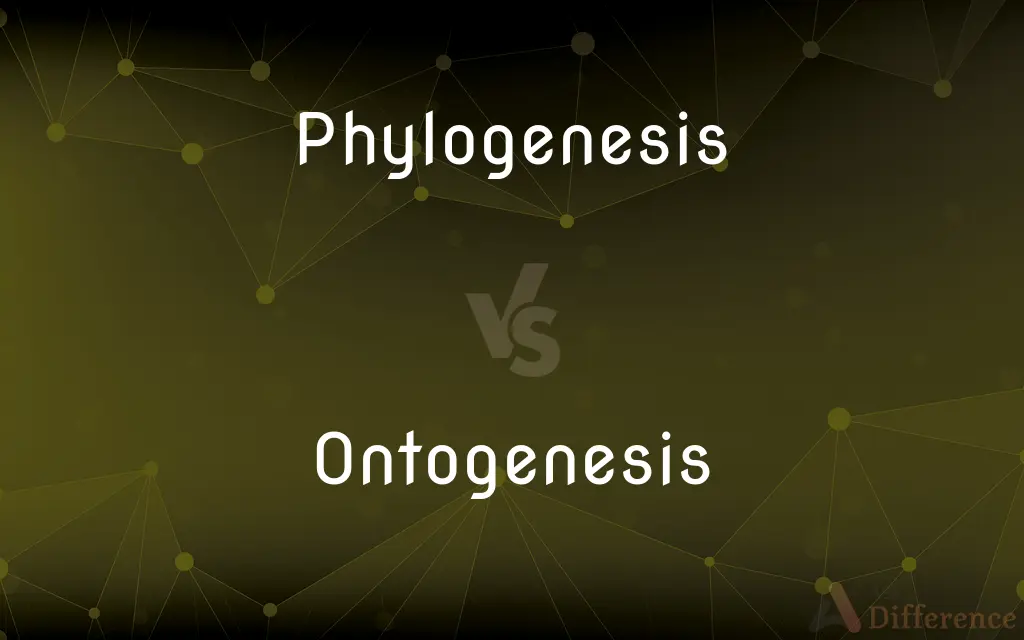Phylogenesis vs. Ontogenesis — What's the Difference?
Edited by Tayyaba Rehman — By Fiza Rafique — Updated on April 17, 2024
Phylogenesis refers to the evolutionary development of a species, while ontogenesis pertains to the development of an individual organism from embryo to maturity.

Difference Between Phylogenesis and Ontogenesis
Table of Contents
ADVERTISEMENT
Key Differences
Phylogenesis focuses on the evolutionary history and the developmental processes of species over generations, highlighting how they adapt and evolve over time. Ontogenesis, on the other hand, details the growth and development of an individual organism, from fertilization to its mature form.
In phylogenesis, biologists study the changes in genetic features and traits that occur across multiple generations, leading to speciation and diversity. Conversely, ontogenesis deals with how these genetic blueprints are expressed in an individual throughout its life stages, including embryonic development, puberty, and aging.
The scope of phylogenesis is broad, examining populations and their interactions with ecosystems over geological timescales. In contrast, ontogenesis observes the biological and physiological processes that occur within the lifespan of a single organism.
Phylogenesis often involves comparisons between different species to understand evolutionary relationships and ancestral lineages. Ontogenesis, meanwhile, might focus on the development of specific organs or systems within an organism, such as the nervous system or skeletal structure.
The methodologies used in phylogenetic studies can include paleontological data, molecular sequencing, and comparative anatomy, whereas ontogenetic studies primarily utilize developmental biology, genetics, and embryology.
ADVERTISEMENT
Comparison Chart
Focus
Evolutionary development of species
Development of an individual organism
Timescale
Generations and geological timescales
Lifespan of an individual
Key Disciplines
Evolutionary biology, genetics, paleontology
Developmental biology, genetics
Study Methods
Molecular sequencing, comparative anatomy
Embryology, physiological studies
Application of Findings
Understanding biodiversity, speciation
Medical science, growth development
Compare with Definitions
Phylogenesis
Study of species evolution over time.
Phylogenesis uses fossils to understand how ancient environments influenced species adaptation.
Ontogenesis
Development of an organism from embryo to adulthood.
Ontogenesis in humans includes stages like infancy, childhood, and adolescence.
Phylogenesis
Concerned with broad evolutionary trends.
Phylogenesis explores how reptiles diversified into numerous forms, including birds.
Ontogenesis
Involves studies of gene expression and environmental influences.
Ontogenesis investigates how exposure to toxins affects fetal development.
Phylogenesis
Evolutionary development and diversification of a species.
Phylogenesis allows scientists to trace the lineage of whales back to land-dwelling mammals.
Ontogenesis
Examines changes at the cellular and systemic levels.
Ontogenesis looks at how the brain develops synapses during early childhood.
Phylogenesis
Tied to concepts of natural selection and adaptation.
Phylogenesis provides evidence for natural selection through physical trait changes over time.
Ontogenesis
Used to understand developmental anomalies and diseases.
Ontogenesis helps researchers understand the onset of congenital heart defects.
Phylogenesis
Involves comparative analysis of different species.
Phylogenesis examines genetic sequences to establish evolutionary relationships.
Ontogenesis
Focuses on individual growth and maturation processes.
Ontogenesis studies how dietary nutrients influence bone development.
Phylogenesis
Phylogenesis (from Greek φῦλον phylon "tribe" + γένεσις genesis "origin") is the biological process by which a taxon (of any rank) appears. The science that studies these processes is called phylogenetics.These terms may be confused with the term phylogenetics, the application of molecular - analytical methods (i.e.
Ontogenesis
See ontogeny.
Phylogenesis
See phylogeny.
Ontogenesis
The generation and development of an individual organism by the characteristic process of ontogeny associated with its species.
Phylogenesis
Evolutionary development of a species.
Ontogenesis
The history of the individual development of an organism; the sequence of events involved in the development of an organism; the history of the evolution of the germ; the development of an individual organism, - in distinction from phylogeny, or evolution of the tribe. Called also henogenesis, henogeny.
Phylogenesis
The history of genealogical development; the race history of an animal or vegetable type; the historic exolution of the phylon or tribe, in distinction from ontogeny, or the development of the individual organism, and from biogenesis, or life development generally.
Ontogenesis
(biology) the process of an individual organism growing organically; a purely biological unfolding of events involved in an organism changing gradually from a simple to a more complex level;
He proposed an indicator of osseous development in children
Phylogenesis
(biology) the sequence of events involved in the evolutionary development of a species or taxonomic group of organisms
Common Curiosities
How does ontogenesis differ from phylogenesis?
Ontogenesis focuses on the development of an individual organism, while phylogenesis concerns the evolutionary history of species.
How does ontogenesis apply to human medicine?
Understanding ontogenesis is vital for diagnosing and treating developmental diseases and conditions in humans.
Can phylogenesis affect ontogenesis?
Yes, evolutionary changes (phylogenesis) can influence developmental processes (ontogenesis) in future generations.
What tools are used to study phylogenesis?
Tools include fossil records, DNA sequencing, and morphological comparisons.
What is phylogenesis?
Phylogenesis is the evolutionary development and diversification of species over time.
What studies are involved in phylogenesis?
Phylogenetic studies often involve paleontology, molecular biology, and comparative anatomy.
What is an example of a phylogenetic study?
A phylogenetic study might analyze DNA to determine the evolutionary relationships among bird species.
Is ontogenesis solely a biological process?
While primarily biological, ontogenesis is also influenced by environmental factors like nutrition and stress.
What impact do evolutionary pressures have on ontogenesis?
Evolutionary pressures can lead to adaptations in developmental processes that enhance survival and reproductive success.
Why is ontogenesis important in biology?
Ontogenesis is crucial for understanding the growth, development, and health of organisms throughout their lifecycle.
Can ontogenetic patterns vary significantly among species?
Yes, ontogenetic patterns can vary widely, reflecting differences in life history strategies among species.
What role does genetics play in ontogenesis?
Genetics are central to ontogenesis, determining how traits are inherited and expressed during development.
How do researchers gather data for ontogenetic studies?
Researchers use techniques like ultrasound imaging, genetic testing, and observational studies to gather ontogenetic data.
How do evolutionary theories relate to phylogenesis?
Evolutionary theories provide frameworks for understanding the mechanisms and outcomes observed in phylogenetic studies.
How is phylogenesis used to inform conservation efforts?
Phylogenesis helps conservationists understand species relationships and how to prioritize actions based on evolutionary distinctiveness.
Share Your Discovery

Previous Comparison
Sincere vs. Honest
Next Comparison
Part vs. ElementAuthor Spotlight
Written by
Fiza RafiqueFiza Rafique is a skilled content writer at AskDifference.com, where she meticulously refines and enhances written pieces. Drawing from her vast editorial expertise, Fiza ensures clarity, accuracy, and precision in every article. Passionate about language, she continually seeks to elevate the quality of content for readers worldwide.
Edited by
Tayyaba RehmanTayyaba Rehman is a distinguished writer, currently serving as a primary contributor to askdifference.com. As a researcher in semantics and etymology, Tayyaba's passion for the complexity of languages and their distinctions has found a perfect home on the platform. Tayyaba delves into the intricacies of language, distinguishing between commonly confused words and phrases, thereby providing clarity for readers worldwide.
















































